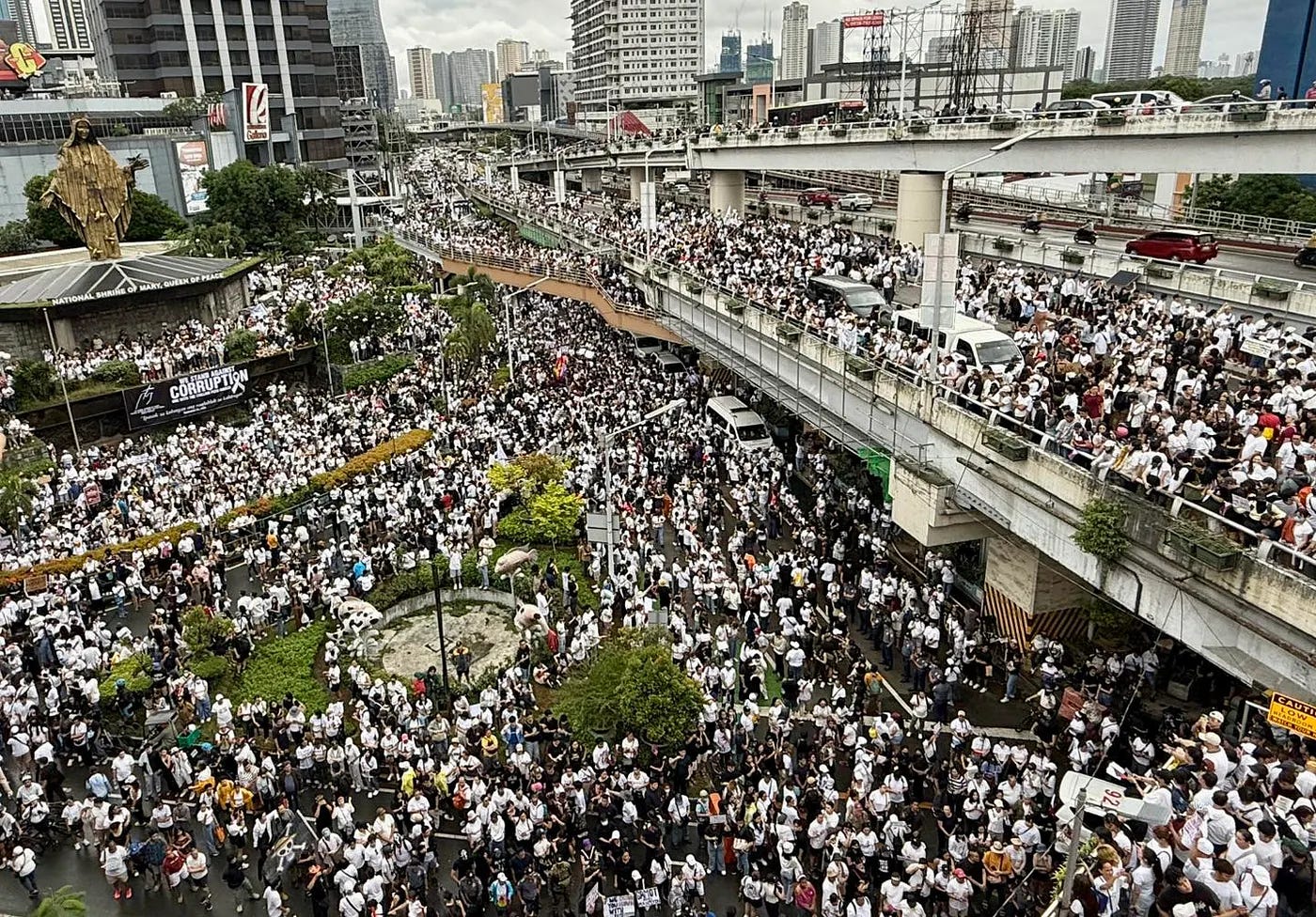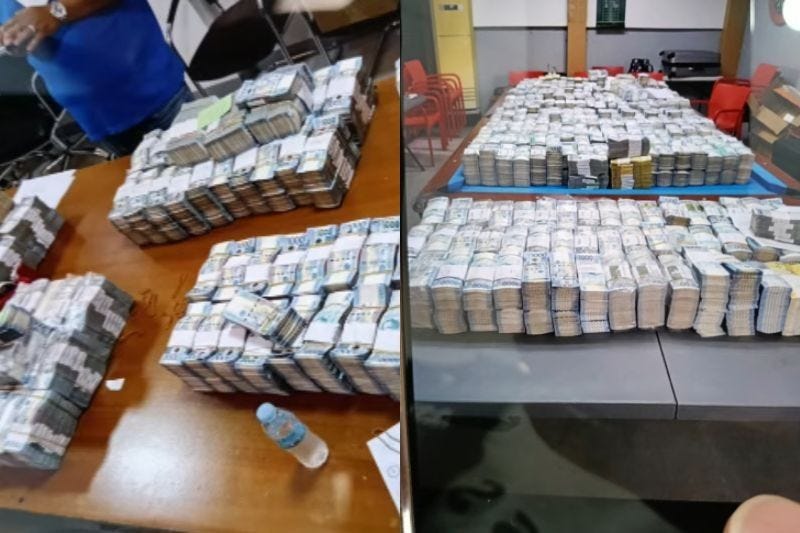Massive Outrage in Manila Over Corruption
Marcos remains uneasily in front of the wave, calling for reform
By: Tita Valderama
The massive turnout of angry Filipinos in last Sunday’s anti-corruption protests, which brought a many as 100,000 protesters to the streets of Metro Manila and other urban centers, has sent shivers down the spine of some who experienced martial law under the regime of the late Ferdinand Marcos Sr., father and namesake of the incumbent president.
The rallies appear unlikely to stop any time soon. The growing outrage leaves the 67-year-old President Ferdinand Marcos Jr, who came to power in 2022 vowing to redeem his father’s name, uneasily riding in front of the protest and doing his best not to be consumed by it as he calls for a cleanup. He was forced to skip the opening of the United Nations General Assembly in New York as he “focuses on local issues,” according to his office.
“The president has to do something drastic because he ran for office to redeem the honor of the Marcos family, and because of this, the corruption now is worse than during his father, so he has to take immediate drastic actions to bring those responsible to justice,” Antonio Carpio, retired associate justice of the Supreme Court, told a broadcaster at the main protest venue on EDSA.
The fury was ignited by pictures of massive piles of cash amassed by government officials along with corporate jets, helicopters and European supercars shown during televised hearings into widespread corruption in government infrastructure projects, including reports of the shameless display of spending by politicians, public officials, private contractors and their relatives while millions of Filipinos continue to suffer from flooding due to substandard and non-existent flood control projects.
Elizaldy “Zaldy” Co, chairman of the powerful House appropriations committee, has fled the country, ostensibly to seek medical care in the United States, amid reports that up to PHP1 billion (US$17.4 million) had been delivered in cash to his penthouse in Manila, requiring several vans and many suitcases.
“What could trigger another big protest…is the results of the ongoing probe: whether high-ranking officials involved in these anomalies will be prosecuted, and what reforms will be made to prevent these anomalies,” said a report by Pacific Strategic Associates, a Manila-based country risk firm.
So far, the scandal has claimed the heads of Senate President Francis Escudero and House Speaker Martin Romualdez, Marcos’s first cousin, dashing Romualdez’s aspirations to succeed Marcos as president in 2028. Escudero and Romualdez were perceived to have masterminded the insertion of more than half a billion pesos in the 2025 budget of the national government for public works projects, from which legislators who proposed specific projects for funding supposedly pocketed as much as 30 percent of project costs.
Rarely do Filipinos see such a gathering of nuns and priests, students, businessmen, workers, celebrities, activists, and others from all walks of life, chanting and holding placards aimed at the corrupt in government. Marcos wasn’t spared. He has been called to account for having approved the budget for the anomalous government projects and for tolerating the corruption in the first half of his six-year term.
The reverberating message was spoken on stage by a popular celebrity named Vice Ganda:
“The era of the good and the resilient is over. The good [people] are being persecuted, the resilient are being driven crazy,” he said to the delight of the protesters, most of them wearing white shirts.
“We challenge you, President Bongbong Marcos, if you want your name to have a good legacy, put all the thieves in jail. We are looking at you, President Bongbong Marcos, and we expect from you not because you are our idol, but because we are paying you and we expect you to fulfill what we, your employers, tell you to do,” he went on.
Organizers of the protest actions, which coincided with the commemoration of the 53rd anniversary of the declaration of martial law by the elder Marcos, who died in exile in 1989, made it clear that the simultaneous rallies were not against his son. But the president was still taken to task for the severity of corrupt acts and their wide-ranging, damaging effects on the people and the country under his administration.
Investigations by congressional committees and independent media agencies have shown the sorry state of numerous infrastructure projects in several areas where legislators and officials of the Department of Public Works and Highways were in cahoots with private contractors, taking a substantial part of the funding for projects, leaving zero to 60 percent of the budget for construction.
Newly appointed DPWH Secretary Vince Dizon and Justice Secretary Jesus Crispin Remulla have initiated the process of confiscating the luxury cars and private jets, and freezing of bank accounts and other identified assets of those involved. On Wednesday, he ordered several officials to justify their lavish lifestyles.
Dizon vowed a top-to-bottom cleansing of the DPWH, which implements thousands of infrastructure projects every year, and a thorough review of the systems and processes in getting the projects done, from identification to allocation of funding to completion.
“If these officials think I am not serious, I hope this is proof that we are serious, that the president is serious about this. And we will spare nobody, top to bottom,” he said in a press conference.
But many are not convinced, watching with eagle eyes how the Marcos administration will hold accountable all those involved, including his relatives such as the former House speaker.
Before the scandal was exposed in July, contractors of government projects, DPWH officials, and legislators allegedly involved in the corruption-riddled flood control projects flaunted their extravagant lifestyle, including ownership of luxury vehicles.
“Let’s not focus on the politics of it. Let’s focus on simple pesos and centavos of it,” Marcos said in a recent press conference when he announced the creation of an independent commission tasked to investigate anomalies in infrastructure projects, from budget preparation to project implementation.
A few days before the Sept. 21 anti-corruption rallies, Marcos said he was in support of the people’s expression of their frustration and anger. “Since this has all been exposed… well, actually it is known to many people — but is now exposed to the general public, do you blame them for going out on the streets?”
“If I weren’t president, I might be out on the streets with them,” said Marcos, whose father was booted out of office in 1986 in a people power revolution over issues of corruption and human rights abuses that drew a million protesters to the streets of Manila.
Protesters booed angrily when Rep. Leila de Lima mentioned it as she spoke on a makeshift stage at Rizal Park in Manila. “We are not president but we are here because we are fed up with people who are becoming crocodiles and demons,” she said.
Newly installed Senate President Vicente Sotto III, who ran under Marcos’ senatorial slate in the May midterm elections, has been actively pursuing the Senate investigation of the anomalous projects while House Speaker Faustino Dy III, a party ally of the president, said House probers would probably stop their inquiry and turn over what it has so far gathered from its initial public hearings, noting that the public has raised questions on their credibility and impartiality, given the alleged involvement of legislators in the anomalous projects.
The DPWH secretary and an undersecretary have resigned while several others have either been dismissed or suspended from the service. At least 20 are facing criminal complaints for graft and tampering with documents.
The three-person Independent Commission for Infrastructure has begun inspecting projects, interviewing, and gathering documents.
Lawyer Howard Calleja, spokesperson of the Church Leaders Council for National Transformation, said the successful September 21 rally is only the beginning, adding that the group will continue monitoring the investigations into the alleged irregularities in various government projects and see to it that the corrupt are held accountable. Church Leaders Council for National Transformation, one of the Sept. 21 rally organizers, is an alliance of church leaders advocating good governance and national renewal.
“The people are fed up with corruption. We’ve had too many scams but we’ve not seen the masterminds in high office going to jail. It’s about time to make corruption painful for them. Let’s make the conviction of corrupt individuals certain so they can’t get away, then engage again in corruption and be voted into office again. accountability should really be the name of the game,” Calleja said in an interview on television.


